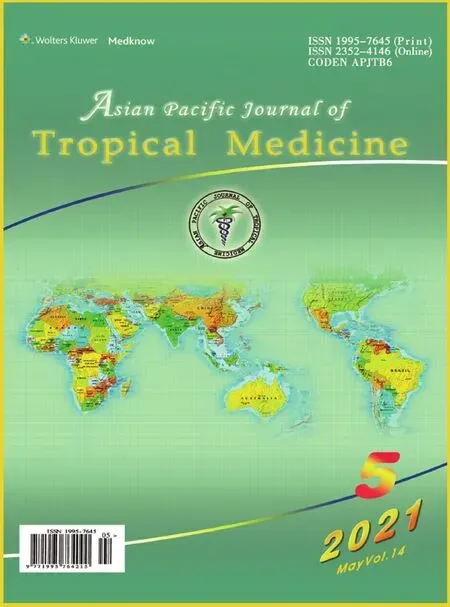Perceived susceptibility, severity, and reinfection of COVID-19 may influence vaccine acceptance-Authors' reply
Giao Huynh, Thien Thuan Tran, Han Thi Ngoc Nguyen, Le An Pham
1Faculty of Public Health, University of Medicine and Pharmacy at Ho Chi Minh City, Ho Chi Minh City, Vietnam
2Infection Control Department, University Medical Center Ho Chi Minh City, Ho Chi Minh City, Vietnam
3Family Medicine Training Center, University of Medicine and Pharmacy at Ho Chi Minh City, Ho Chi Minh City, Vietnam
Authors’ reply: We would like to thank you for your interesting comments. Our study aims to understand healthcare workers’intention to receive a COVID-19 vaccination and the factors that affect their ability to do so, based on the domains of the Health Belief Model (HBM) in the period that COVID-19 vaccine was not available in Vietnam.
HBM was used widely as the theoretical framework to explain how the acceptance of changes in health-related behaviors of individuals is mainly due to their perceptions[1]. It showed that individual beliefs about their health and illness conditions played an important role in determining their preventive actions such as vaccination[1].This study determined the key factors in the HBM that can forecast a person’s intention to partake in the vaccination process. If individuals believe that they are a probability of susceptibility to an illness, which would have serious consequences to themselves, and believe that the vaccination benefits outweigh the barriers (costs,inconvenience, danger, side effects) to vaccination, they will be more likely to accept and willing to participate in the vaccination process to decrease their personal risks. Additionally, “Cues to action” are added in the model as external factors, where individuals are more likely to follow up from recommendations if they receive “Cues to action”, such as reminders or announcements[2]. Besides, baseline demographics, sociopsychology, and knowledge variables that were also included in HBM may indirectly affect health behaviors. For example, educational level or knowledge toward disease is thought to have indirectly related to the perception of susceptibility, severity,benefits, and barriers to actions, and thus influencing their behavior.Until now, Vietnam has successfully dealt with COVID-19 by pooling and utilizing domestic resources and manpower to track the possible source of all infections. The number of confirmated cases is low and most of healthcare workers (HCWs) have not been infected.Before the immunization program is to be conducted, HCWs directly caring for COVID-19 patients have been considered one of the compulsory groups for vaccination, especially if the subjects had a medical comorbid illness status.
Therefore, this study concentrated on investigating the intention to get vaccinated against COVID-19 among HCWs who did not directly care for patients with COVID-19, but are considered at high risk of contracting COVID-19, and may refuse the uptake of the vaccine.
In Vietnam, COVID-19 information has been conveyed via a variety of channels including television, social media, and formal health websites that have been strictly approved by Health Ministry to ensure faster updating of information to the community, so the possibility of spreading misinformation has also been limited.Across the country, people have received information on mass media, websites, mobile applications, and automatic SMS notifications, which increased the awareness of the community as well as update knowledge and learning materials about this pandemic[3].
In the context, the COVID-19 pandemic continued to be a threat to the lives of people all over the globe. We performed a crosssectional survey among HCWs to assess their perceptions towards the vaccine immediately based on HBM before the vaccination.
However, the HBM is a cognitively based model, there are some factors that are not included in the model. For example, it does not account for the emotional component of behavior, and individual’s attitudes or other determinants that oblige the health behavior acceptance (fear of reinfection or the medical comorbid illness status that may be an indirect predictor of willingness to get a vaccination).Regarding people with medical comorbidities, we did consider this in a separate study[4]. Moreover, the study of Shmueli found that HBM variables as well as demographic (gender and education),the health-related factor (having received influenza vaccine last year), and Theory of Planned Behavior model variables including subjective norms, attitudes toward the vaccine, and self efficacy,were associated with intention to get vaccinated against COVID-19[5]. Therefore, in addition to the variables in the HBM, there are other factors that influence vaccination intention, to which we will conduct in the future research.
Conflict of interest statement
The authors declare there are no conflicts of interest.
 Asian Pacific Journal of Tropical Medicine2021年5期
Asian Pacific Journal of Tropical Medicine2021年5期
- Asian Pacific Journal of Tropical Medicine的其它文章
- Perceived susceptibility, severity, and reinfection of COVID-19 may influence vaccine acceptance
- Successful containment of a COVID-19 outbreak in Bach Mai Hospital by prompt and decisive responses
- S gene drop-out predicts super spreader H69del/V70del mutated SARS-CoV-2 virus
- Extensively drug-resistant Salmonella typhi causing rib osteomyelitis: A case report
- Circulation of Brucellaceae, Anaplasma and Ehrlichia spp. in borderline of Iran,Azerbaijan, and Armenia
- Morphological study and molecular epidemiology of Anisakis larvae in mackerel fish
